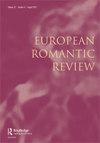The Politics of Speculative Collectivities in the Work of Friedrich Schelling
IF 0.1
0 HUMANITIES, MULTIDISCIPLINARY
引用次数: 0
Abstract
ABSTRACT In Friedrich Schelling’s philosophy of nature, the attempt to think the unconditioned absolute of nature performs unconditioning, thereby transforming the present into a field of experimentation. Schelling’s nature-philosophy produces a series of interventions into cultural fields of consistency, drawing on material operations to reconceptualize forms of collective organization. In Schelling’s First Outline, beings have a specific signature: to be is to resist. In the Deities of Samothrace, philosophy performs a “magic singing” that gathers initiates together by continually exorcising—and preserving—the unruly obstinacy of pre-socialized drives. This conception of philosophy coheres with a gesture from his earlier lectures on the philosophy of art in which music forms the basis of inorganic communities, implicitly cultivating collective forms called upon to navigate the dangers of overly cohesive (harmonic) and overly transgressive (rhythmic) forms of life, while directing an unconditioning power to the conditions of the present.谢林作品中的思辨集体政治
在谢林的自然哲学中,对自然的无条件绝对的思考是无条件的,从而将现在转化为一个实验领域。谢林的自然哲学产生了一系列对一致性文化领域的干预,利用物质操作来重新概念化集体组织的形式。在谢林的《第一大纲》中,存在有一个特定的签名:存在就是反抗。在萨莫色雷斯的众神中,哲学表演了一种“神奇的歌声”,通过不断驱除和保存前社会化冲动的不守规矩的固执,将信徒聚集在一起。这一哲学概念与他早期关于艺术哲学的演讲中的一种姿态相一致,即音乐构成了无机社区的基础,隐含地培养了集体形式,要求他们驾驭过度凝聚(和谐)和过度越界(节奏)的生命形式的危险,同时将一种无条件的力量引向当前的条件。
本文章由计算机程序翻译,如有差异,请以英文原文为准。
求助全文
约1分钟内获得全文
求助全文
来源期刊

European Romantic Review
HUMANITIES, MULTIDISCIPLINARY-
CiteScore
0.30
自引率
50.00%
发文量
61
期刊介绍:
The European Romantic Review publishes innovative scholarship on the literature and culture of Europe, Great Britain and the Americas during the period 1760-1840. Topics range from the scientific and psychological interests of German and English authors through the political and social reverberations of the French Revolution to the philosophical and ecological implications of Anglo-American nature writing. Selected papers from the annual conference of the North American Society for the Study of Romanticism appear in one of the five issues published each year.
 求助内容:
求助内容: 应助结果提醒方式:
应助结果提醒方式:


